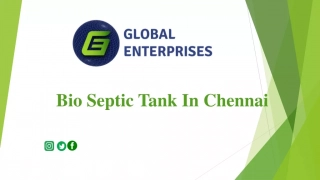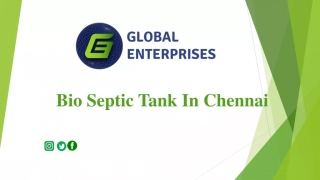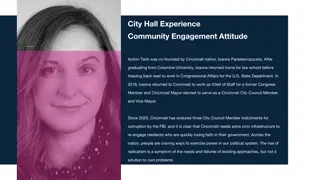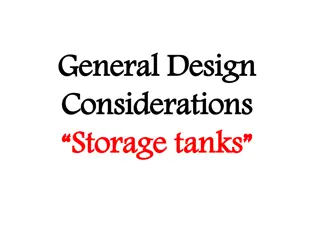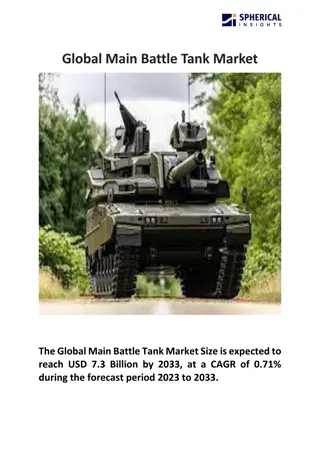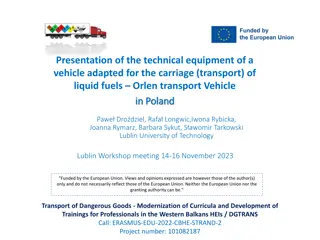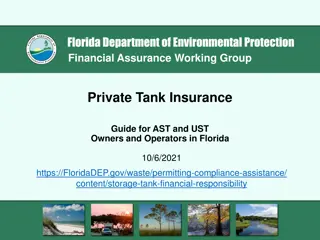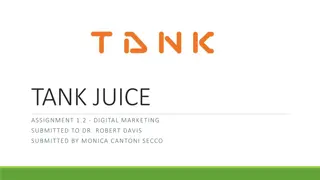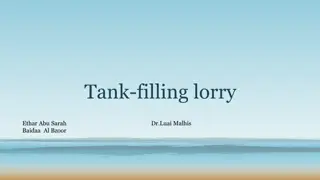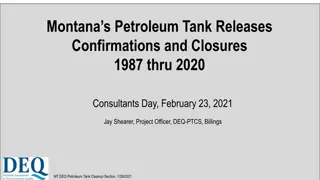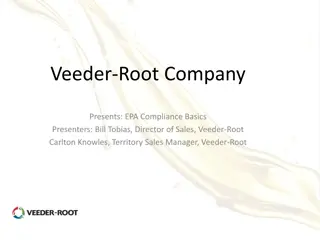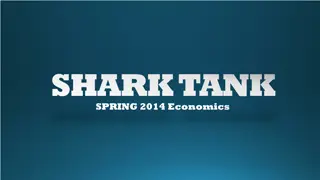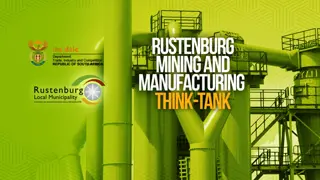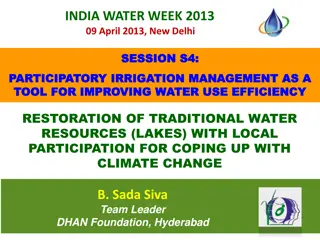
The Role of Think Tanks in Policy-Making
Explore the history, functions, and impact of think tanks in influencing public policy. From normative definitions to functional descriptions, learn about the various roles these organizations play in shaping decisions at both national and international levels.
Uploaded on | 1 Views
Download Presentation

Please find below an Image/Link to download the presentation.
The content on the website is provided AS IS for your information and personal use only. It may not be sold, licensed, or shared on other websites without obtaining consent from the author. If you encounter any issues during the download, it is possible that the publisher has removed the file from their server.
You are allowed to download the files provided on this website for personal or commercial use, subject to the condition that they are used lawfully. All files are the property of their respective owners.
The content on the website is provided AS IS for your information and personal use only. It may not be sold, licensed, or shared on other websites without obtaining consent from the author.
E N D
Presentation Transcript
WHAT IS A THINK TANK? History, roles and models Enrique Mendizabal, On Think Tanks
DOES THIS SOUND FAMILIAR? I do a lot of work with policymakers, but how much effect am I having? It s like they re coming in and saying to you, I m going to drive my car off a cliff. Should I or should I not wear a seatbelt? And you say, I don t think you should drive your car off the cliff. And they say, No, no, that bit s already been decided the question is whether to wear a seatbelt. And you say, Well, you might as well wear a seatbelt. And then they say, We ve consulted with policy expert Rory Stewart and he says . . " Extracted from: Washington s Think Tanks: Factories to Call Our Own
WHAT IS A THINK TANK? Thinktanker s answer The public s answer
THINK TANK WHAT IS IN THE LABEL? Think Tank Research Centre Public Policy Research Institute Idea Factory University Research Centre Investigation Centre Laboratory of Ideas
WHAT IS YOUR LABEL OF CHOICE? What are think tanks called in your country? Would the average voter know what a think tank is?
FROM NORMATIVE DEFINITIONS At one extreme, the definition is written into law: United States legal code says: 501 (c)(3) organisations are non-for-profit, non- partisan, and organised for educational, religious, charitable and scientific purposes (Harvard Law Review, 2002). More common, however: Non-profit, independent of the state and dedicated to communicating research findings to policymakers. (Some now accept the presence of state-funded think tanks or state-own think tanks).
TOWARDS MORE FUNCTIONAL DESCRIPTIONS Viewed collectively, think tanks [ ] are organizations that generate policy-oriented research, analysis, and advice on domestic and international issues in an effort to enable policymakers and the public to make informed decisions about public policy issues (McGann 2006) Independent (and usually private) policy research institutes containing people involved in studying a particular policy area or a broad range of policy issues, actively seeking to educate or advise policy makers and the public through a number of channels. (Buldioski 2012)
DIFFICULT TO PIN-POINT The common definition describes [ think tanks ] as a distinctive class of organisations different and separate from universities, markets, and the state However, these think tanks only exist in the imaginary of those who idealized the Brookings and Chatham Houses of this world. Most think tanks exist on the boundaries with others.
SELF-LABELLING EXERCISE Tom Medvetz argues that the act of labelling is a political act this is the art of forging an identity John Schwartz calls it an intellectual territory The label is adopted and rejected with equal passion by organisations wishing to join or set themselves apart from the think tank community. Calls attention to the boundaries of the definition:
WHEN DOES AN ORGANISATION STOP BEING a think tank that generates some of its income through consultancy and become just a consultancy? an academic think tank, based in a university, and focused on a range of fairly broad and theoretical issues, and become just an academic research centre? an advocacy think tank with strong ideological arguments to become just an activist organisation? a think tank with a strong convening power to become simply a commission or network? a think tank with a strong media presence to become a not-for-profit (or for profit even) media outfit? a publicly funded and managed think tank based in a ministry or another public body to become a policymaking body itself?
THEY SHARE MUCH WITH OTHERS Source: Stephen Yeo
THE SPACE OF THINK TANKS Source: Thomas Medvetz
Might be more useful to ask what do they do
FUNCTIONS INCLUDE They generate research and knowledge They can advance and promote policy ideas and solutions; They can provide legitimacy to policies and politicians (whether it is ex-ante or ex-post) They are advisors in policy issues, but also on implementation; They can act as spaces for debate and deliberation even as a sounding board for policymakers and opinion leaders. In some context they provide a safe house for intellectuals and their ideas; They can provide a financing channel for political parties and other policy interest groups; They attempt to influence the way the policy process works; They are providers of cadres of experts and policymakers for political parties and governments; They act as auditor or social monitors; etc.
THIS HAS AN IMPACT ON THE ORGANISATION ITSELF Depending on which boundary they are on, we could argue that they need to have people and teams with skills to: Appreciate and undertake research (boundary with academia); Communicate effectively to boarder audiences and the public (boundary with the media); Undertake analysis and deliver solutions (boundary with consultancy); Analyse policy and provide actionable recommendations (boundary with policy and politics); and Work with citizens to develop new ideas and solutions (boundary with NGOs).
THINK TANKS GOTTA SERVE SOMEBODY The State Political Parties The Private Sector and Private Advocates International development agencies Well, it may be the devil or it may be the Lord But you're gonna have to serve somebody ( Bob Dylan)
CONTEXT MATTERS Further complicated by the effects that the context can have on the formation and development of think tanks Political context can be a driver and a constraint for their formation Economic context can define who are the main funders Legal context can determine the business models chosen Education policy/state of higher education focus of think tanks
THE CONSEQUENCE IS AN INCREASINGLY MESSY COMMUNITY There are regional and national traditions and waves of formation National and sectoral particularities New and ever-changing business models that buck the trend Greater competition And less trust in experts and expertise thus a strategic rejection of the label
A BRIEF HISTORY OF AMERICAN THINK TANKS Provides a case study to consider the evolution of think tanks in our own countries Draws attention to the power of narratives in the formation and development of think tanks And the changing nature of the label, think tanks and the community
FROM MEDICINE TO MARKETING The history of think tanks in the US is marked by a series of waves of development which explain the great heterogeneity in the current landscape. They are partly driven by the changing role that science, the state, the private sector and civil society are assumed to play in society.
SOCIETY AS THE PATIENT American Association of Economics (1885) Bureau of Economic Research (1899) National Civil Federation (1900) American Bureau of Industrial Research (1904) Chicago Civil Federation (1894) Experts, funders, citizens, and policymakers came together Treated the symptoms and (later) the causes of social maladies Russell Sage Foundation (1907) Marks the beginning of a new professional cadre of policy researchers
EFFICIENCY AND VALUE FOR MONEY Twentieth Century Fund National Bureau of Economic Research New York Bureau of Municipal Research (1907) Institute for Government Research (1916 then Brookings) Sought to influence policy from the outside Focused on improvements in government processes Flourished thanks to professional philanthropy
CRISIS AND PLANNING FOR THE FUTURE The Great Depression and the First World War changed the focus towards reflecting upon and explaining what had happened Twentieth Century Fund (1922) Committee for Economic Development (1942) RAND Corporation (1948) Recommendations Plans for long term results Plans including implementation Is this where the label was coined?
SALOMONS HOUSE AND THE REVOLVING DOOR After the Second World War, Brookings, Russell Sage Foundation and NBER offer advice and moved to DC to serve agencies under pressure to deliver the complex New Deal Council of Economic Advisers (1946) Thinktankers take on boundary roles Such was the extend of the revolving door that The Economist described Brookings researchers as [President] Kennedy s experts on tap. And RAND was the main recruiting ground for the Department of Defence.
THE IDEOLOGICAL MARKETPLACE The Hudson Institute (1961) The Heritage Foundation (1973) The Cato Institute (1977) Explicitly ideological Funding increasingly partisan and private (foundations reduced their role) Set up by people already in politics Think tanks adopt new corporate practices and marketing approaches
THE IDEOLOGICAL BATTLEGROUND Heritage has founded Heritage Action for America Think tanks in Washington DC and London have to worry about being hacked Think tanks in the Western Balkans are subject to State surveillance Think tanks across the world are subject to defamation laws Think tanks (and thinktankers) are increasingly and explicitly siding with parties and political leaders
SIMILAR WAVES ELSEWHERE In Chile, China, Russia, etc. These are defined by the growth of certain ideas, political or economic shocks, institutional reforms, etc.
Thank you! enrique@onthinktanks.org
SCHOOL for THINKTANKERS www.ott.school

